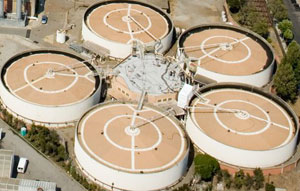 photo courtesy of the San Francisco Public Utilities CommissionWe’d had "aging infrastructure" on our story lists for some time when we first heard about the sewage spills in Mill Valley. When news came in that not just one, but two sewage spills had poured five million gallons of partially treated wastewater into Richardson Bay, we decided to move that story to the top of the list.
photo courtesy of the San Francisco Public Utilities CommissionWe’d had "aging infrastructure" on our story lists for some time when we first heard about the sewage spills in Mill Valley. When news came in that not just one, but two sewage spills had poured five million gallons of partially treated wastewater into Richardson Bay, we decided to move that story to the top of the list.
Those spills got a lot of coverage, including by KQED, so our question was a little broader. Were those spills an anomaly? (Answer: No, they were big, but not unusual.) And how does this happen in as eco-conscious a place as the Bay Area? What would it take to stop it?
The two Mill Valley spills seem to have resulted from a few different problems: overwhelmed capacity, failed alarms, operator error, and probably other factors, too. But the underlying cause is the same, and it’s true of many sewage systems in the Bay Area: These systems -- the pipes, the digesters, the pumps – are reaching the end of their useful lives. (Some of the older clay pipes were built in the 1850s!) Few cities are jumping to do the necessary upgrades, and who can blame them? What’s less sexy than an expensive, disruptive construction project that takes place mostly underground, out of sight?
Still, as we say in the piece, we’ve done it before. Those who lived in the Bay Area before the 1970s may remember the stench of raw sewage drifting up through the car window as they crossed the Bay. Thanks to the Clean Water Act of 1972, the Bay is vastly cleaner than it used to be and there are far less spills.
So what will it take to get cities to pony up the cash this time around? Baykeeper is taking the issue to the courts – you can read more about their Sick of Sewage campaign here: http://www.baykeeper.org/
